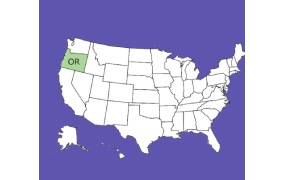Author: Vince Sliwoski
Can a creditor, landlord or other third party take a security interest in an OLCC license? Can an OLCC licensee collateralize or pledge its license– as if that license were personal property, and not just a permission conferred by the state? These are two sides of an academic question we’ve been batting around for years because it has serious, practical implications. The short answer is: “yes, an OLCC license can be collateralized.”
Now, what I just wrote is an unsatisfactory legal answer, for reasons beyond the scope of this article (suffice it to say that it shouldn’t work). But it can and does work regardless. The OLCC agrees. Lawyers in the Oregon cannabis bar also agree. Courts… haven’t disagreed. Thus, some of us cannabis lawyers have been securitizing OLCC licenses, and OLCC licensed businesses, for years.
The rule at issue here is OAR 825-025-1260 (the “Rule”). To paraphrase, the Rule allows OLCC to grant any of the following persons “temporary authority” to operate a licensed business:
- A trustee
- The receiver of an insolvent or bankrupt business
- The personal representative of a deceased licensee
- A person holding a [defaulted] security interest in the business
Here’s the documentation OLCC requires to confer temporary authority under the Rule, per a recent slide presentation from the Commission itself:
- For trustees, receiver or personal representative (“PR”)
- Proof the person is the legal trustee, receiver or PR (court order establishing non-licensee’s rights in the business, legal access documents, and written request for authority)
- A written request for authority to operate as the trustee, receiver, or PR which should include the address and telephone number of the trustee, receiver or PR
- For secured party
- Proof of a security interest in the licensed business
- Proof of the licensee’s default on the secured debt
- Proof of legal access to the real property; and
- A written request for authority to operate as a secured party which should include the address and telephone number of the secured party
You may have questions at this point. One of the more compelling is: “what kind of proof of default will OLCC accept?” The answer is: “a court order is typically required.” In some cases, OLCC may also accept a licensee’s acknowledgment of its grant of a security interest and subsequent default. My office, working with OLCC, the Oregon Department of Justice and one other law firm, was able to push through the first of these outside of court on that basis, back in 2019.
Does it matter that a court order isn’t a security interest under UCC Article 9? Nope. Does is matter that an OLCC licensee cannot transfer or “sell” its license without OLCC approvals? Nope. None of this matters. All that matters is the fact that OLCC currently treats these licenses like personal property which can be secured, collateralized, transferred and liquidated for value. The fact that OLCC isn’t issuing new licenses, yet allows the “sale” of existing licenses, is consistent with this treatment.
I should emphasize at this point that the Rule contemplates only a “temporary” operational authority by a third party. The purpose of the Rule is to allow a third party to step in and wind up the business, rather than run the business indefinitely. Thus, when OLCC issues an order under the Rule, it gives a standard, 60-day horizon. Extensions are liberally granted, provided the third party can provide a satisfactory explanation of need in each case.
I should also emphasize that the Rule will likely change next year, in conjunction with rulemaking OLCC plans to undertake on related concepts of “licensability” and license transfers. (Here, I am assuming the HB 4016 license issuance moratorium will be extended beyond March 31, 2024.) You can expect to see the Rule built out to address the adjudicated incapacity of a licensee, for starters. But you can also expect serious discussion about the fundamental validity of a rule or practice that allows a party to securitize a “license.” At this point, It’s just a question of whether the OLCC addresses this before a court does.
For now, take good care in drafting your security agreements, pledge agreements, leases, etc. An OLCC license can be a valuable asset. Failing to collateralize that asset in the manner that OLCC would like to see could impair the rights and recovery prospects of anyone owed money by a licensed Oregon cannabis business.
For related posts, check out the following:





